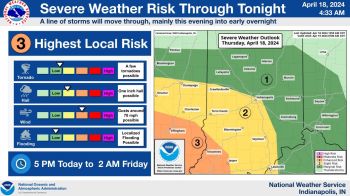(INDIANAPOLIS) — Some hospital procedures are on hold again as Indiana scrambles to get ahead
of the coronavirus pandemic.
Governor Holcomb says the state “is on fire,” with thousands of new infections and 400 new hospital
admissions each day. Starting next Wednesday, hospitals must postpone non-emergency inpatient
procedures for inpatients till at last January 3. Hospitals’ count of COVID patients has been over
three-thousand for three weeks, and Holcomb says doctors and nurses are “exhausted.” He says
pausing non-urgent care creates a buffer to make sure hospitals have space and staff available for a
flood of COVID patients.
It’s the second time in the pandemic Indiana has limited hospitals to emergency patients to reserve
room for a COVID surge.
Holcomb and state health commissioner Kristina Box says although it’s been two weeks since
Thanksgiving, Indiana isn’t fully clear of a case surge linked to holiday gatherings, because infections
build on each other. People who caught the virus over the long weekend could still pass it along to
others.
Holcomb is also tightening state restrictions on mass gatherings, eliminating local health
departments’ authority to approve exceptions to those limits. The cap is 25 people in 36 counties
rated at high risk on the Indiana State Department of Health’s color-coded map, and four more
counties which just edged below the red-zone threshold this week. For the rest of the state,
including Marion, Hamilton and Boone Counties, the limit is 50 people.
School activities and college and pro sports are operating under different limits. College and pro
sports are capped at quarter-capacity, in consultation with local health departments. Holcomb says
the combination of giant arenas and the teams’ ability to enforce mask requirements and other
precautions make those events less likely to turn into superspreader events. High school sports
crowds and other after-school activities are also capped at quarter-capacity in 52 “orange zone”
counties. In high-risk counties, no spectators are allowed except family members.
Holcomb says the restrictions are an attempt to target those events with the most potential to stem
the tide of the virus before it spins out of control. Box says contact tracing has repeatedly shown
private gatherings, including weddings, funerals and parties, to be the most troublesome events for
the virus’s spread. She says they’re typically indoors, and people are more likely to take off their
masks and neglect social distancing.













